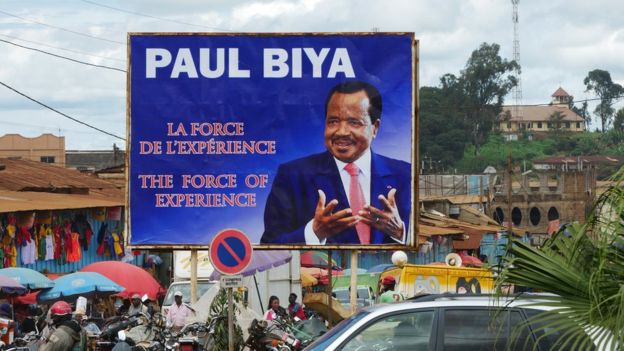
Vote counting is still in progress in the Cameroon presidential election that has been disrupted by a number of violent incidents in English-speaking parts of the country, leaving at least three people dead.
The BBC’s Ngala Killian Chimtom, in Yaoundé, reported on the run-up to the polls, as the octogenarian leader, Paul Biya, seeks a seventh term in office.
A large poster of Paul Biya hangs like a street sign in Cameroon’s western city of Bafoussam.
“The force of experience,” reads the poster in reference to President Biya’s 36 years in power, to which he now hopes to add another seven-year term.
A couple of metres from the poster, members of Mr Biya’s governing CPDM party are meeting to drum up support for the person they call their hero.
“Young people may be eloquent. They may make big promises, but none of them can have the steady hands to run a large country like Cameroon,” says party supporter Emmanuel Ndam, 58.
“For over 30 years, our president has been tested by various crises, and each time, he has been able to overcome,” Mr Ndam adds.
“Just look at the mature way he handled the Bakassi crisis with Nigeria. Some hot-headed youth could just have messed up the situation,” he adds, before making his way into the meeting hall.
His comrade Alice Meye, 22, agrees. She says only President Biya has the wherewithal to resolve Cameroon’s myriad crises, most urgent of which is the unrest in the country’s two English-speaking regions.
“We have a president who does what he promises to do. He has said he will solve the problems of our Anglophone brothers. Let’s give him a chance.”
“Even in death, President Paul Biya will continue to reign,” she said.
BBC
